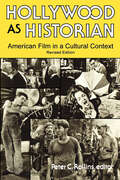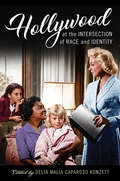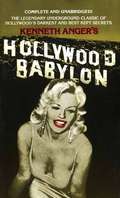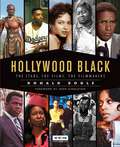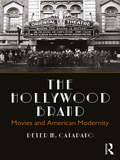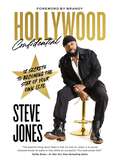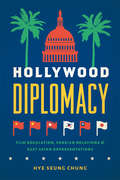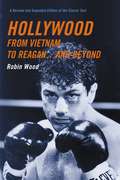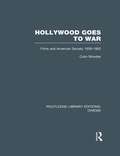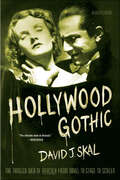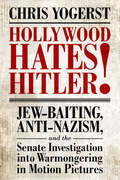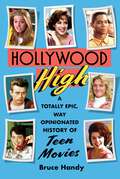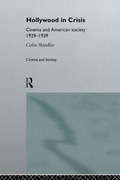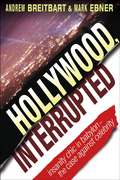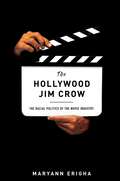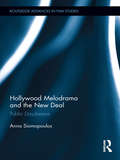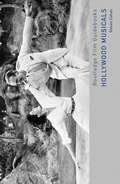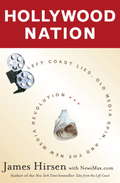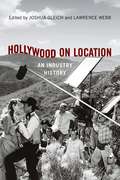- Table View
- List View
Hollywood As Historian: American Film in a Cultural Context
by Peter C. Rollins“A commendably comprehensive analysis of the issue of Hollywood’s ability to shape our minds . . . invigorating reading.” ?BooklistFilm has exerted a pervasive influence on the American mind, and in eras of economic instability and international conflict, the industry has not hesitated to use motion pictures for propaganda purposes. During less troubled times, citizens’ ability to deal with political and social issues may be enhanced or thwarted by images absorbed in theaters. Tracking the interaction of Americans with important movie productions, this book considers such topics as racial and sexual stereotyping; censorship of films; comedy as a tool for social criticism; the influence of “great men” and their screen images; and the use of film to interpret history. Hollywood As Historian benefits from a variety of approaches. Literary and historical influences are carefully related to The Birth of a Nation and Apocalypse Now, two highly tendentious epics of war and cultural change. How political beliefs of filmmakers affected cinematic styles is illuminated in a short survey of documentary films made during the Great Depression. Historical distance has helped analysts decode messages unintended by filmmakers in the study of The Snake Pit and Dr. Strangelove. Hollywood As Historian offers a versatile, thought-provoking text for students of popular culture, American studies, film history, or film as history. Films considered include: The Birth of a Nation (1915), The Plow that Broke the Plains (1936), The River (1937), March of Time (1935-1953), City Lights (1931), Modern Times (1936), The Great Dictator (1940), The Grapes of Wrath (1940), Native Land (1942), Wilson (1944), The Negro Soldier (1944), The Snake Pit (1948), On the Waterfront (1954), Dr. Strangelove (1964), Who’s Afraid of Virginia Woolf? (1966), and Apocalypse Now (1979).“Recommended reading for anyone concerned with the influence of popular culture on the public perception of history.” ?American Journalism
Hollywood at the Intersection of Race and Identity
by Ruth Mayer Alice Maurice Ellen C. Scott Delia Malia Konzett Jonna Eagle Ryan Jay Friedman Charlene Regester Matthias Konzett Chris Cagle Dean Itsuji Saranillio Graham Cassano Priscilla Peña Ovalle Ernesto R Acevedo-Muñoz Mary Beltrán Jun Okada Louise WallenbergHollywood at the Intersection of Race and Identity explores the ways Hollywood represents race, gender, class, and nationality at the intersection of aesthetics and ideology and its productive tensions. This collection of essays asks to what degree can a close critical analysis of films, that is, reading them against their own ideological grain, reveal contradictions and tensions in Hollywood’s task of erecting normative cultural standards? How do some films perhaps knowingly undermine their inherent ideology by opening a field of conflicting and competing intersecting identities? The challenge set out in this volume is to revisit well-known films in search for a narrative not exclusively constituted by the Hollywood formula and to answer the questions: What lies beyond the frame? What elements contradict a film’s sustained illusion of a normative world? Where do films betray their own ideology and most importantly what intersectional spaces of identity do they reveal or conceal?
Hollywood Babylon: The Legendary Underground Classic of Hollywood's Darkest and Best Kept Secrets
by Kenneth AngerWHITE ELEPHANTS--the God of Hollywood wanted white elephants, and white elephants he got--eight of 'em, plaster mammoths perched on mega-mushroom pedestals, lording it over the colossal court of Belshazzar, the pasteboard Babylon built beside the dusty tin-lizzie trail called Sunset Boulevard.
Hollywood Black: The Stars, the Films, the Filmmakers (Turner Classic Movies)
by Donald BogleThe films, the stars, the filmmakers-all get their due in Hollywood Black, a sweeping overview of blacks in film from the silent era through Black Panther, with striking photos and an engrossing history by award-winning author Donald Bogle.The story opens in the silent film era, when white actors in blackface often played black characters, but also saw the rise of independent African American filmmakers, including the remarkable Oscar Micheaux. It follows the changes in the film industry with the arrival of sound motion pictures and the Great Depression, when black performers such as Stepin Fetchit and Bill "Bojangles" Robinson began finding a place in Hollywood. More often than not, they were saddled with rigidly stereotyped roles, but some gifted performers, most notably Hattie McDaniel in Gone With the Wind (1939), were able to turn in significant performances.In the coming decades, more black talents would light up the screen. Dorothy Dandridge became the first African American to earn a Best Actress Oscar nomination for Carmen Jones (1954), and Sidney Poitier broke ground in films like The Defiant Ones and 1963's Lilies of the Field. Hollywood Black reveals the changes in images that came about with the evolving social and political atmosphere of the US, from the Civil Rights era to the Black Power movement. The story takes readers through Blaxploitation, with movies like Shaft and Super Fly, to the emergence of such stars as Cicely Tyson, Richard Pryor, Eddie Murphy, and Whoopi Goldberg, and of directors Spike Lee and John Singleton.The history comes into the new millennium with filmmakers Barry Jenkins (Moonlight), Ava Du Vernay (Selma), and Ryan Coogler (Black Panther); megastars such as Denzel Washington, Will Smith, and Morgan Freeman; as well as Halle Berry, Angela Bassett, Viola Davis, and a glorious gallery of others.Filled with evocative photographs and stories of stars and filmmakers on set and off, Hollywood Black tells an underappreciated history as it's never before been told.
Hollywood Blockbusters: The Anthropology of Popular Movies
by Peter Wogan David SuttonCertain Hollywood movies are now so deeply woven into the cultural fabric that lines of their dialogue - for example, 'Make him an offer he can't refuse' - have been incorporated into everyday discourse. The films explored in this book, which include The Godfather, Jaws, The Big Lebowski, Field of Dreams and The Village, have become important cultural myths, fascinating windows into the schisms, tensions, and problems of American culture. Hollywood Blockbusters: The Anthropology of Popular Movies uses anthropology to understand why these movies have such enduring appeal in this age of fragmented audiences and ever-faster spin cycles. Exploring key anthropological issues from ritual, kinship, gift giving and totemism to literacy, stereotypes, boundaries and warfare, this fascinating book uncovers new insights into the significance of modern film classics for students of Film, Media, Anthropology and American Cultural Studies.
The Hollywood Brand: Movies and American Modernity
by Peter M. CatapanoThe Hollywood Brand traces the development of the moving picture from its humble roots as an object of mass amusement to its transformation into an art form worthy of exhibition in museums and academic study in leading universities. This book provides historical context to the ideas that coalesce to create the iconic Hollywood brand that comes to define American identity.
Hollywood Confidential: 12 Secrets to Becoming the Star of Your Own Life
by Steve JonesHow long will you wait to live your dreams? Maybe you're just starting out and are unsure where to invest your time and energy. Maybe you've started and stopped so much already that your fallback plan has become the only plan. Maybe you've simply lost touch with your creative self. In Hollywood Confidential, Steve Jones shares his twelve secrets to success accrued from working alongside some of today's most powerful voices in entertainment.Known for production successes such as Jennifer Lopez's first holiday visual and the Oprah Winfrey Network's record-breaking #1 docuseries Black Love, Steve knows the endurance and optimism it takes to pursue your passion. In Hollywood Confidential, he dishes out inspiration from his two-decade L.A. career and what he has learned from the megastars he's worked with and admired. Inside you'll find:Practical suggestions for silencing your inner critic, making the most of failures, and giving yourself permission to shineMotivating ideas to help you live out your purpose, extracted from the case studies and success stories of twelve of Hollywood&’s top actors and personalities that Steve has produced in TV/Media, or interviewed on his platform including Issa Rae, Tabitha Brown, Regina King, Angela Bassett, and moreAffirmations to keep you going as you cast a vision for who you want to becomeThought-provoking questions for reflection at the end of every chapterStrategies for anyone dreaming of moving out of the shadows, into the spotlight and leading role of their life Full of unforgettable wisdom and powerful perspective from industry leaders, Hollywood Confidential is the perfect gift for:Those who are looking to discover their purpose in lifeEveryone who has a dream to live their best, most authentic lifeThe self-made creative looking to make their mark on the worldAnyone eager to break into the entertainment or music industriesFans of Steve Jones&’s popular event series Hollywood ConfidentialReaders who enjoy anecdotes and advice from today's industry leaders It's time to take your place at the center of your life's stage. Hollywood Confidential is the jolt of encouragement you need to embrace your creative self, your biggest dreams, and your innate desire to live a fulfilled, satisfying life.
Hollywood Diplomacy: Film Regulation, Foreign Relations, and East Asian Representations
by Hye Seung ChungHollywood Diplomacy contends that, rather than simply reflect the West’s cultural fantasies of an imagined “Orient,” images of Chinese, Japanese, and Korean ethnicities have long been contested sites where the commercial interests of Hollywood studios and the political mandates of U.S. foreign policy collide, compete against one another, and often become compromised in the process. While tracing both Hollywood’s internal foreign relations protocols—from the “Open Door” policy of the silent era to the “National Feelings” provision of the Production Code—and external regulatory interventions by the Chinese government, the U.S. State Department, the Office of War Information, and the Department of Defense, Hye Seung Chung reevaluates such American classics as Shanghai Express and The Great Dictator and applies historical insights to the controversies surrounding contemporary productions including Die Another Day and The Interview. This richly detailed book redefines the concept of “creative freedom” in the context of commerce: shifting focus away from the artistic entitlement to offend foreign audiences toward the opportunity to build new, better relationships with partners around the world through diplomatic representations of race, ethnicity, and nationality.
Hollywood Fantasies of Miscegenation: Spectacular Narratives of Gender and Race
by Susan CourtneyHollywood Fantasies of Miscegenation analyzes white fantasies of interracial desire in the history of popular American film. From the first interracial screen kiss of 1903, through the Production Code's nearly thirty-year ban on depictions of "miscegenation," to the contemplation of mixed marriage in Guess Who's Coming to Dinner (1967), this book demonstrates a long, popular, yet underexamined record of cultural fantasy at the movies. With ambitious new readings of well-known films like D.W. Griffith's 1915 epic The Birth of a Nation and of key forgotten films and censorship documents, Susan Courtney argues that dominant fantasies of miscegenation have had a profound impact on the form and content of American cinema. What does it mean, Courtney asks, that the image of the black rapist became a virtual cliché, while the sexual exploitation of black women by white men under slavery was perpetually repressed? What has this popular film legacy invited spectators to remember and forget? How has it shaped our conceptions of, and relationships to, race and gender? Richly illustrated with more than 140 images, Hollywood Fantasies of Miscegenation carefully attends to cinematic detail, revising theories of identity and spectatorship as it expands critical histories of race, sex, and film. Courtney's new research on the Production Code's miscegenation clause also makes an important contribution, inviting us to consider how that clause was routinely interpreted and applied, and with what effects.
Hollywood from Vietnam to Reagan . . . and Beyond
by Robin WoodThis classic of film criticism, long considered invaluable for its eloquent study of a problematic period in film history, is now substantially updated and revised by the author to include chapters beyond the Reagan era and into the twenty-first century. For the new edition, Robin Wood has written a substantial new preface that explores the interesting double context within which the book can be read-that in which it was written and that in which we find ourselves today. Among the other additions to this new edition are a celebration of modern "screwball" comedies like My Best Friend's Wedding, and an analysis of '90s American and Canadian teen movies in the vein of American Pie, Can't Hardly Wait, and Rollercoaster. Also included are a chapter on Hollywood today that looks at David Fincher and Jim Jarmusch (among others) and an illuminating essay on Day of the Dead.
Hollywood Goes Oriental: CaucAsian Performance in American Film
by Tom Gunning Karla Rae FullerAn in-depth look at the portrayal of Asian characters by non-Asian actors in classical Hollywood film.
Hollywood Goes to War: Films and American Society, 1939-1952 (Routledge Library Editions: Cinema)
by Colin ShindlerA historian’s view of the relationship between American history and the American film industry, this book is a witty and perceptive account of Hollywood and its films in the years from the outbreak of the Second World War in Europe to the end of the war in Korea, It describes how film makers and their industry were shaped by and responded to the strong political and social stimuli of wartime America. The author examines the recurring question of whether the movies were a reflection of the society in which they were produced, or whether by virtue of their undeniable propaganda power the films shaped that society. Combining evidence from literary, visual and oral sources, he covers a wide range of movies, emphasising in particular Casablanca, Mrs Miniver, The Best Years of Our Lives and Since You Went Away. In addition to placing the films in a social and political context, the author shows that Hollywood is a perfect example of the bone-headed way in which people behave when they are dealing with large amounts of money and power. Enjoyably nostalgic, this book will appeal to film enthusiasts as well as those interested in war and its effect on society.
Hollywood Gothic: The Tangled Web of Dracula from Novel to Stage to Screen
by David J. SkalA fully updated edition of David J. Skal's Hollywood Gothic, "The ultimate book on Dracula" (Newsweek).The primal image of the black-caped vampire Dracula has become an indelible fixture of the modern imagination. It's recognition factor rivals, in its own perverse way, the familiarity of Santa Claus. Most of us can recite without prompting the salient characteristics of the vampire: sleeping by day in its coffin, rising at dusk to feed on the blood of the living; the ability to shapeshift into a bat, wolf, or mist; a mortal vulnerability to a wooden stake through the heart or a shaft of sunlight. In this critically acclaimed excursion through the life of a cultural icon, David J. Skal maps out the archetypal vampire's relentless trajectory from Victorian literary oddity to movie idol to cultural commodity, digging through the populist veneer to reveal what the prince of darkness says about us all.includes black-and-white Illustrations throughout, plus a new Introduction.
Hollywood Hates Hitler!: Jew-Baiting, Anti-Nazism, and the Senate Investigation into Warmongering in Motion Pictures
by Chris YogerstIn September 1941, a handful of isolationist senators set out to tarnish Hollywood for warmongering. The United States was largely divided on the possibility of entering the European War, yet the immigrant moguls in Hollywood were acutely aware of the conditions in Europe. After Kristallnacht (the Night of Broken Glass), the gloves came off. Warner Bros. released the first directly anti-Nazi film in 1939 with Confessions of a Nazi Spy. Other studios followed with such films as The Mortal Storm (MGM), Man Hunt (Fox), The Man I Married (Fox), and The Great Dictator (United Artists). While these films represented a small percentage of Hollywood’s output, senators took aim at the Jews in Hollywood who were supposedly “agitating us for war” and launched an investigation that resulted in Senate Resolution 152. The resolution was aimed at both radio and movies that “have been extensively used for propaganda purposes designed to influence the public mind in the direction of participation in the European War.” When the Senate approved a subcommittee to investigate the intentions of these films, studio bosses were ready and willing to stand up against the government to defend their beloved industry. What followed was a complete embarrassment of the United States Senate and a large victory for Hollywood as well as freedom of speech. Many works of American film history only skim the surface of the 1941 investigation of Hollywood. In Hollywood Hates Hitler! Jew-Baiting, Anti-Nazism, and the Senate Investigation into Warmongering in Motion Pictures, author Chris Yogerst examines the years leading up to and through the Senate Investigation into Motion Picture War Propaganda, detailing the isolationist senators’ relationship with the America First movement. Through his use of primary documents and lengthy congressional records, Yogerst paints a picture of the investigation’s daily events both on Capitol Hill and in the national press.
Hollywood High: A Totally Epic, Way Opinionated History of Teen Movies
by Bruce HandyFrom a longtime Vanity Fair writer and editor, a delightfully entertaining, intelligent, and illuminating history and tribute to teen movies—from Rebel Without a Cause to Fast Times at Ridgemont High, and on to John Hughes, Mean Girls, The Hunger Games, and more.What influence did Francis Ford Coppola have on George Lucas&’s American Graffiti? And Lucas on John Singleton&’s Boyz n the Hood? How does teenage sexuality in Fast Times at Ridgemont High compare to Twilight? Which teen movies pass the Bechdel test? Why is Mean Girls actually the last great teen film of the 20th century? In the same way that Peter Biskind&’s Easy Riders, Raging Bulls connects the films of the 1970s to the period&’s cultural upheaval, and David Hadju&’s Positively 4th Street tells the story of the sixties through the emergence of folk music, Bruce Handy&’s Hollywood High situates iconic teen movies within their times and reveals the intriguing stories, artists, and passions behind their creation. These films aren&’t merely beloved stories; they reflect teens&’ growing economic and cultural influence, societal panics, and shifting perceptions of youth in America. Much more than a nostalgia trip, Hollywood High is a lively, provocative, and affectionate cultural history, spanning nearly one hundred years. Handy, an acclaimed journalist and critic who spent two decades at Vanity Fair, examines the defining films of each generation and builds connections between them. From the Andy Hardy classics (1937–1946) to the iconic Rebel Without a Cause (1955); Beach Party series (1963–1968); American Graffiti (1973); Fast Times at Ridgemont High (1982); the John Hughes touchstones Sixteen Candles, The Breakfast Club, Pretty in Pink, and Ferris Bueller&’s Day Off (1984–1986); Boyz N the Hood (1991); Mean Girls (2004); the Twilight saga (2008–2012); and The Hunger Games series (2012–2015); this is a captivating deep dive into the world of teen movies that captures their sweeping history and influence. We&’ll hear from icons James Dean, Annette Funicello, George Lucas, Amy Heckerling, John Hughes, Molly Ringwald, John Singleton, Tina Fey, and Kristen Stewart, and discover why the most timeless teen movies resonate across generations.
Hollywood in Crisis: Cinema and American Society 1929-1939 (Cinema and Society)
by Colin SchindlerFirst published in 1996. Routledge is an imprint of Taylor & Francis, an informa company.
Hollywood, Interrupted: Insanity Chic in Babylon -- The Case Against Celebrity
by Mark Ebner Andrew Breitbart"Reading Hollywood Interrupted is like sitting on a stakeout and having a telescopic view into the darkest reaches of the corruption and perversity of today's celebrity culture. From the very first page to the last, Breitbart and Ebner's probing reporting spells out in graphic detail how Hollywood lives by a set of norms the rest of America finds appropriately appalling--and endlessly fascinating. The authors have the unusual courage to take on Scientology. They provide revelations about Michael Jackson's sickness that go beyond even today's headlines. They rip the phony veneer off the political correctness of Rosie O'Donnell and Barbra Streisand. They give readers a behind-the-scenes understanding of how snooping private eyes and ruthless information brokers feed scoops to the tabloids. And, in one riveting chapter, they document how a young woman in the AOL backroom unmasked the bizarre fetishes of some of Tinseltown's top names. Hollywood. Interrupted no channel fluff. It's disturbing stuff. But it's all too real and it's utterly riveting."
The Hollywood Jim Crow: The Racial Politics of the Movie Industry
by Maryann ErighaThe story of racial hierarchy in the American film industry The #OscarsSoWhite campaign, and the content of the leaked Sony emails which revealed, among many other things, that a powerful Hollywood insider didn’t believe that Denzel Washington could “open” a western genre film, provide glaring evidence that the opportunities for people of color in Hollywood are limited. In The Hollywood Jim Crow, Maryann Erigha tells the story of inequality, looking at the practices and biases that limit the production and circulation of movies directed by racial minorities. She examines over 1,300 contemporary films, specifically focusing on directors, to show the key elements at work in maintaining “the Hollywood Jim Crow.” Unlike the Jim Crow era where ideas about innate racial inferiority and superiority were the grounds for segregation, Hollywood’s version tries to use economic and cultural explanations to justify the underrepresentation and stigmatization of Black filmmakers. Erigha exposes the key elements at work in maintaining Hollywood’s racial hierarchy, namely the relationship between genre and race, the ghettoization of Black directors to black films, and how Blackness is perceived by the Hollywood producers and studios who decide what gets made and who gets to make it. Erigha questions the notion that increased representation of African Americans behind the camera is the sole answer to the racial inequality gap. Instead, she suggests focusing on the obstacles to integration for African American film directors. Hollywood movies have an expansive reach and exert tremendous power in the national and global production, distribution, and exhibition of popular culture. The Hollywood Jim Crow fully dissects the racial inequality embedded in this industry, looking at alternative ways for African Americans to find success in Hollywood and suggesting how they can band together to forge their own career paths.
The Hollywood Kid: The Violent Life and Violent Death of an MS-13 Hitman
by Oscar Martinez Juan MartinezThe compelling story of the life and death of a Salvadoran gangsterAs a boy, Miguel Ángel Tobar’s small town in El Salvador was torn apart by guerrillas and US- backed death squads. Still a preteen, he joined a different kind of death squad—the Hollywood Locos Salvatrucha—a clique of the Mara Salvatruchas, better known as MS-13. This international criminal organization began on the streets of Los Angeles in the 1980s, as Salvadoran children, whose families had fled their country’s civil war, banded together to defend themselves from LA gangs. Denied refugee status, the Salvadorans found themselves pushed into the shadows and besieged by violence, and MS-13 itself mutated into a gang. When large-scale US deportations began, violence was exported from the United States to El Salvador, helping make it one of the world’s deadliest countries and in turn propelling new waves of refugees northward. The Salvadoran journalist Óscar Martinez and his anthropologist brother Juan José Martínez got to know the Hollywood Kid when he informed on MS-13. In his hideaway shack, he recounted a life of killing—a death toll of more than fifty rival gang members—until his own murder ended the story. Vivid and violent, The Hollywood Kid brings a brutal world to life, illustrating the geopolitical forces propelling a country toward ever more vicious extremes.
Hollywood Melodrama and the New Deal: Public Daydreams (Routledge Advances in Film Studies)
by Anna SiomopoulosWhile many critics have analyzed the influence of the FDR administration on Hollywood films of the era, most of these studies have focused either on New Deal imagery or on studio interactions with the federal government. Neither type of study explores the relationship between film and the ideological principles underlying the New Deal. This book argues that the most important connections between the New Deal and Hollywood melodrama lie neither in the New Deal iconography of these films, nor in the politics of any one studio executive. Rather, the New Deal figures prominently in Hollywood melodramas of the Depression era because these films engage the political ideas underlying welfare state policies—ideas that extended the reach of government into the private realm. As the author shows, Hollywood melodramas interrogated New Deal principles of liberal empathy—consumer citizenship, the refeudalization of the state, and minimal economic redistribution—only to support welfare-state ideology in the end.
Hollywood Musicals (Routledge Film Guidebooks)
by Steven CohanHollywood Musicals offers an insightful account of a genre that was once a mainstay of twentieth-century film production and continues to draw audiences today. What is a film musical? How do musicals work, formally and culturally? Why have they endured since the introduction of sound in the late 1920s? What makes them more than glittery surfaces or escapist fare? In answering such questions, this guidebook by Steven Cohan takes new and familiar viewers on a tour of Hollywood musicals. Chapters discuss definitions of the genre, its long history, different modes of analyzing it, the great stars of the classic era, and auteur directors. Highlights include extended discussions of such celebrated musicals from the studio era as The Love Parade, Top Hat, Holiday Inn, Stormy Weather, The Gang’s All Here, Meet Me in St. Louis, Cover Girl, Mother Wore Tights, Singin’ in the Rain, Gentlemen Prefer Blondes, The Band Wagon, Seven Brides for Seven Brothers, and Jailhouse Rock as well as later films such as Cabaret, All that Jazz, Beauty and the Beast, and La La Land. Cohan brings in numerous other examples that amplify and extend to the present day his claims about the musical, its generic coherence and flexibility, its long and distinguished history, its special appeal, and its cultural significance. Clear and accessible, this guide provides students of film and culture with a succinct but substantial overview that provides both analysis and intersectional context to one of Hollywood’s most beloved genres.
Hollywood Nation
by James HirsenFrom the bestselling author ofTales from the Left Coast. Now entering Hollywood Nation, where fact blurs with fiction, virtue with vice Now more than ever, stars like Michael Moore, Sean Penn, and Susan Sarandon are acting as self-appointed celebrity pundits, blurring the lines between entertainment and news to force their views onto the rest of the country. With their politically charged films, distorted documentaries, and skewed docudramas, they’re trying to set the agenda with little regard for the truth. Even worse, many so-called journalists are doing the same thing, dangerously mixing information and entertainment in an attempt to ratchet up ratings—and to inject their own views into the news. InHollywood Nation,New York Timesbestselling author and media critic James Hirsen reveals how the New Media are leading the counterattack against the relentless liberal assault from East Coast newsrooms and Left Coast studios. Through his extensive research and exclusive interviews with news and entertainment iconoclasts—including Bill O’Reilly, Mel Gibson, and Ann Coulter—Hirsen shows how liberals are losing their stranglehold on political and cultural debates. With a new chapter full of news about the ongoing Hollywoodization of America, Hirsen’s smart and compellingHollywood Nationgives us ammunition for the battle to reclaim our country and our culture.
Hollywood on Location: An Industry History
by Jennifer Lynn Peterson Sheri Chinen Biesen Noelle Griffis Daniel Steinhart Julian StringerLocation shooting has always been a vital counterpart to soundstage production, and at times, the primary form of Hollywood filmmaking. But until now, the industrial and artistic development of this production practice has been scattered across the margins of larger American film histories. Hollywood on Location is the first comprehensive history of location shooting in the American film industry, showing how this mode of filmmaking changed Hollywood business practices, production strategies, and visual style from the silent era to the present. The contributors explore how location filmmaking supplemented and later, supplanted production on the studio lots. Drawing on archival research and in-depth case studies, the seven contributors show how location shooting expanded the geography of American film production, from city streets and rural landscapes to far-flung territories overseas, invoking a new set of creative, financial, technical, and logistical challenges. Whereas studio filmmaking sought to recreate nature, location shooting sought to master it, finding new production values and production economies that reshaped Hollywood’s modus operandi.
Hollywood Planet: Global Media and the Competitive Advantage of Narrative Transparency (Routledge Communication Series)
by Scott Robert OlsonThe popularity of American television programs and feature films in the international marketplace is widely recognized but scarcely understood. Existing studies have not sufficiently explained the global power of the American media nor its actual effects. In this volume, Scott Robert Olson tackles the issue head on, establishing his thesis that the United States' competitive advantage in the creation and global distribution of popular taste is due to a unique mix of cultural conditions that are conducive to the creation of "transparent" texts--narratives whose inherent polysemy encourage diverse populations to read them as though they are indigenous. Olson posits that these narratives have meaning to so many different cultures because they allow viewers in those cultures to project their own values, archetypes, and tropes into the movie or television program in a way that texts imported from other cultures do not, thus enabling the import to function as though it were an indigenous product. As an innovative volume combining postcolonial and postmodern theory with global management strategic theory, Hollywood Planet is one of the first studies that attempts to account theoretically for numerous recent ethnographic studies that suggest different interpretations of television programs and film by a variety of international audiences. Relevant to studies in media theory and other areas of the communication discipline, as well as anthropology, sociology, and related fields, Hollywood Planet contains a powerful and original argument to explain the dominance of American media in the global entertainment market.
Hollywood Puzzle Films (AFI Film Readers)
by Warren BucklandFrom Inception to The Lake House, moviegoers are increasingly flocking to narratologically complex puzzle films. These puzzle movies borrow techniques—like fragmented spatio-temporal reality, time loops, unstable characters with split identities or unreliable narrators—more commonly attributed to art cinema and independent films. The essays in Hollywood Puzzle Films examine the appropriation of puzzle film techniques by contemporary Hollywood dramas and blockbusters through questions of narrative, time, and altered realities. Analyzing movies like Source Code, The Butterfly Effect, Donnie Darko, Déjà Vu, and adaptations of Philip K. Dick, contributors explore the implications of Hollywood's new movie mind games.
